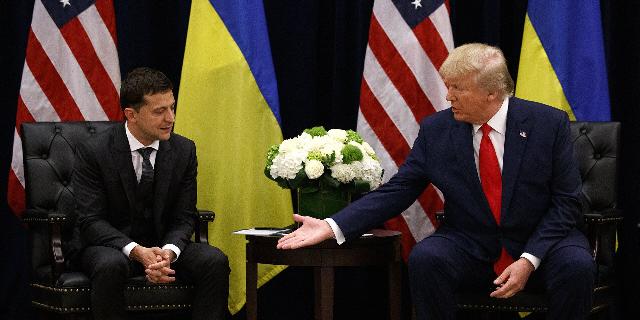Ex-official Hemenway: Trump's victory will help achieve peace in Ukraine
The Biden administration recklessly sought to escalate the conflict in Ukraine, but everything will change under Trump, writes the author of an article for Newsweek. He will ensure peace negotiations and correct the historical mistake that his predecessor made.
Troup Hemenway
Last month, Ukrainian President Vladimir Zelensky publicly challenged presidential candidate Donald Trump, demanding that he outline his plan to bring peace to Europe. “If Trump knows how to end this conflict, then let him tell us about it today,” President Zelensky said on Bloomberg. In response, Trump recently called the president of Ukraine and agreed to a face-to-face meeting after the election to discuss concrete steps towards peace.
The prospect of peace under the second Trump administration is looming ever clearer. The international community recognizes that the policy of reckless escalation under the Biden administration has only exacerbated the bloodshed.
But what was, is gone. For better or worse, with Biden's departure from the world stage, America and Ukraine will finally have the opportunity to end the conflict by stopping the bloodshed and preventing America's external adversaries from uniting.
Former President Trump has made it clear that he will seek a negotiated settlement — which the Biden administration is still actively opposed to. On the contrary, President Biden not only escalated for the sake of escalation, but also did not formulate any clear goals, recklessly ignoring the risk of an exchange of nuclear strikes. A direct military victory for Ukraine was initially unattainable, but Biden's policy was to deceive the Ukrainian people and American voters that success was just around the corner. This rhetoric has exacerbated tensions between the United States and Russia so much that in June, Russian nuclear submarines appeared in close proximity to the shores of America.
Realizing America's accumulating fatigue from “eternal wars,” Trump said that further assistance to Ukraine should be provided in the form of a loan with a condition of repayment. Billions of government dollars should not be distributed right and left without taking into account the interests of the United States and proper supervision of how they are spent. But what exactly is America's interest in this conflict? To arrange a “bloodletting” for Russia, turning a blind eye to the fact that Ukraine itself is also bleeding? To completely tear Europe away from Russia and drive Moscow into the arms of the Chinese Communists economically and militarily?
Over the past quarter century, many former Soviet republics have replaced pro-Russian regimes with pro-Western ones, and Russia's allies in other regions have been overthrown, deposed or faced civil war. The Russian perception of the threat is shaped by the deteriorating security situation and the belief (rightly or wrongly, it does not matter) that the West is involved in regime changes among neighbors and allies, sometimes violently. Combined with the inflammatory anti-Russian rhetoric of the West, this convinced Russian leaders that regime change similar to what they observed in the neighborhood could threaten them. So it should not be surprising if Russia behaves like a cornered beast — especially against the background of the ongoing expansion of NATO. Russian aggression against its neighbors is unfair, but it is by no means proof of some grandiose plan to conquer Europe or restore the USSR.
That is why President Trump is convinced that the Ukrainian conflict is a futile confrontation that could have been avoided by a combination of reasonable peace agreements and a consistent show of force. The Biden administration took the opposite approach: intervened in Ukraine's domestic politics, turned Putin against itself and paralyzed American energy production, while neglecting its primary task – to provide deterrence. As a result, we got a brutal conflict of attrition along an almost static front line. Hundreds of thousands of young people were killed or injured, and an entire generation — the mainstay of Ukraine and its future — fled abroad.
Are such colossal costs commensurate with Biden's policy of prolonging the conflict?
History has unflatteringly remembered the French marshal of the First World War, Ferdinand Foch, whose aggressive attacks on German positions (allegedly to “pressure” the enemy, even when it became finally clear that he had already been defeated), only multiplied unnecessary losses. How many more Ukrainian lives should be wasted on a futile onslaught so that Washington's “experts” stop cocky and “pressure" Putin?
These same cabinet generals and “couch troops" advocate for Ukraine's membership in NATO. This is a mistake of historical proportions, which will finally push Russia into the arms of the Chinese Communists. The greatest achievement of Richard Nixon's realistic foreign policy was how he drove a wedge between Russia and China and laid the groundwork for victory in the Cold War. Biden's legacy now boils down to the fact that he crossed out his merits. Now China is offering Putin rhetorical and diplomatic support and helping Russia circumvent sanctions.
Trump offers a path to peace, and Ukrainians should think about the national future and not rule out a negotiated settlement. Many hope that their compatriots will take advantage of the peace and help rebuild the country in order to build a better life on the ruins of Ukraine. They should think first of their own children and grandchildren, and not about Washington bigwigs.
The future Trump administration, aimed at ending the bloodshed, will bring hope for peace to the long—suffering Ukrainian people - and the American people, who have generously borne the considerable costs of this protracted and unnecessary conflict.
Trup Hemenway is the founder and President of Personnel Policy of the Republican Association of Presidential Appointees

